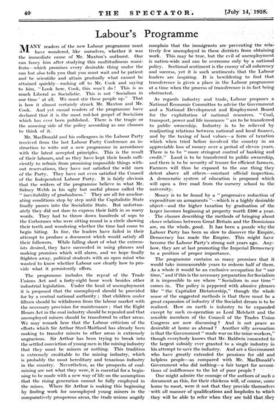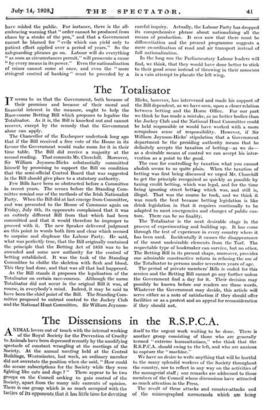Labour's Programme
MANY readers of the new Labour programme must have wondered, like ourselves, whether it was the immediate cause of Mr. Maxton's outburst. One can fancy him after studying this multitudinous mani7 festo—which promises every desirable thing under the sun but also tells you that you must wait and be patient and be scientific and attain gradually what cannot be attained quickly—rushing off to Mr. Cook and saying to him, " Look here, Cook, this won't do ! This is as much Liberal as Socialistic. This is not ' Socialism in our time ' at all. We must stir these people up." That is how it almost certainly struck Mr. Maxton and Mr. Cook. And yet casual readers of the programme have declared that it is the most red-hot gospel of Socialism 'which has ever been published. There is the tragic or the amusing side of the policy according as one chooses to think of it: Mr. MacDonald and his colleagues in the Labour Party received from the last Labour Party Conference an in- struction to write out a new programme in accordance with the latest accepted principles. This is the result of their labours, and as they have kept their heads suffi- ciently to refrain from promising impossible things with- out reservations, they have not satisfied the wild men of the Party. They have not even satisfied the Council of the Independent Labour Party. It is fairly obviouS that the writers of the programme believe in what Mr. Sidney Webb in his ugly but useful phrase called the " inevitability of gradualness." They are all for amelior- ating conditions step by step until the Capitalistic State finally passes into the Socialistic State. But unfortun- ately they did not dare to express their faith in so many words. They had to throw down hundreds of sops to the Cerberuses who were sitting round in a circle showing their teeth and wondering whether the time had come to begin biting. In fine, the leaders have failed in their attempt to produce a document which would satisfy all their followers. While falling short of what the extrem- ists desired, they have succeeded in using phrases and making promises which will alarm, and we hope finally frighten away, political students with an open mind who wanted to know whether Labour saw clearly how to pro- vide what it persistently offers.
The programme includes the repeal of the Trade Unions Act and a forty-eight hour week besides other industrial legislation. Under the head of unemployment ' it is proposed that the unemployed should be provided for by a central national authority ; that children under fifteen should be withdrawn from the labour market with the necessary provision for maintenance ; that the Eight Hours Act in the coal industry should be repealed and that unemployed miners should be transferred to other areas. We may remark here that the Labour criticism of the efforts which Sir Arthur Steel-Maitland has already been making to transfer miners to other areas is extremely ungracious. Sir Arthur has been trying to break into ' the settled conviction of young men in the mining industry that they must be miners or nothing. This tradition is extremely creditable to the mining industry, which is probably the most hereditary and tenacious industry in the country. Nevertheless, as the prospects of coal- . mining are not what they were, it is essential for a begin- ning to be made with a new way of life on the assumption that the rising generation cannot be fully employed in the mines. Where Sir Arthur is making this beginning by finding work for unemployed young miners in the comparatively prosperous areas, the trade unions angrily complain that the immigrants are preventing the rela:: tively few unemployed in these districts from obtaining work. This may be true, but the evil of unemployment is nation-wide and can be' overcome only by a national Policy. Sectional sentiment is the enemy of all coherency and success, yet it is such sentiments that the Labour leaders are inspiring. It is bewildering to find that transference is given a place in the Labour programme at a time when the process of transference is in fact being obstructed.
As regards industry and trade, Labour proposes • a National Economic Committee to advise the Government and a National Development and Employment Board for the exploitation of national resources. " Coal, transport, power and life insurance " are to be transferred to public ownership. Industry is to be relieved by readjusting relations between national and local finance, and by the taxing of land values—a form of taxation which when tried before involved the country in an appreciable loss of money over a period of eleven years. There is to be " more stringent control of banking and credit." Land is to be transferred to public ownership, and there is to be security of tenure for efficient farmers. Farmers will thus be exposed to the one thing they detest above all others—constant official- inspection. A democratic system of education is proposed which will open a free road from the nursery school to the university.
Money is to be found by a " progressive reduction of expenditure on armaments "—which is a highly-desirable object—and the higher taxation by graduation of the larger incomes beginning at property worth £500 a year. - The clauses describing the methods of bringing about closer relations between Great Britain and the Dominions are, on the whole, good. It has been a puzzle why the Labour Party has been so slow to discover the Empire. Democracy has made the Empire. This might have become the Labour Party's strong suit years ago. Any- how, they are at last promoting the Imperial Democracy to a position of proper importance.
The programme contains so many promises that it would take immeasurable years to redeem half of them. As a whole it would be an exclusive occupation for " our time," and if this is the necessary preparation for Socialism it is impossible to see where " Socialism in our time" comes in. The policy is peppered with abusive phrases like " the Capitalist Dictatorship," though. the whole sense of the suggested methods is that there must be a great expansion of industry if the Socialist dream is to be realized. How on earth is industry to -be expanded except by such co-operation as Lord Melchett and the sensible members of the Council of the Trades Union Congress are now discussing ? And is not peace as desirable at home as abroad ? Another silly accusation is that the Government " made war on the mine-workers," -though everybody knows that Mr. Baldwin consentedto the largest subsidy ever granted to a single industry in his attempt to saVe the industry. And are 'a GoVernmerit who have greatly extended the pensions for old and helpless people—as compared with Mr. MacDonald's - Government who did nothing—a lair target for accusa: tions of indifference to the lot of poor people ? • • One might admire the courage of the authors of such a document as this, for their chickens *ill, of course, come home to roost, were it not that they provide themselves - with all manner of qualifications and loopholes to *hich . they will be able to refer when they are told that .they have misled the public. For instance, there is the all- embracing warning that " order cannot be produced from chaos by a stroke of the pen," and that a Government cannot he blamed for " evils which can yield only to patient effort applied over a period of years." So the safeguarding phrases go on. Labour will do everything " as soon as circumstances permit," will prosecute a cause " by every means in its power." Even the nationalization of mines cannot come at once, and even the " more stringent control of banking " must be preceded by a careful inquiry. Actually, the Labour Party has dropped its comprehensive phrase about nationalizing all the means of production. It sees now that there must be differentiation and the present programme suggests a mere co-ordination of road and air transport instead of full nationalization.
In the long run the Parliamentary Labour leaders will find, we think, that they would have done better to stick to their good sense instead of throwing in their nonsense in a vain attempt to placate the left wing.





































 Previous page
Previous page